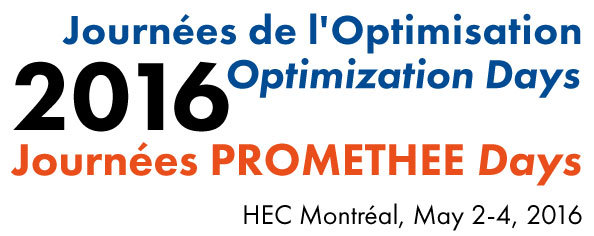
2016 Optimization Days
HEC Montréal, Québec, Canada, 2 — 4 May 2016

TB3 Decomposition Methods in Optimization
May 3, 2016 03:30 PM – 05:10 PM
Location: EY
Chaired by Jean Bertrand Gauthier
4 Presentations
-
 03:30 PM - 03:55 PM
03:30 PM - 03:55 PMA contraction-expansion algorithm for network flow problems
With respect to network flow problems, the order in which negative cycles are canceled defines the algorithm used for the resolution. It apparently also plays a role in dictating the time complexity of the latter. The minimum mean cycle-canceling algorithm and Cancel-and-Tighten are prime examples of strongly polynomial algorithms. We discuss facets of the analysis and extract fundamental aspects that explain this behavior. A Contraction-Expansion algorithm is proposed alongside comparative results.
-
 03:55 PM - 04:20 PM
03:55 PM - 04:20 PMA column generation post-optimization heuristic for the integrated aircraft and passenger recovery problem
The joint aircraft and passenger recovery problem is modeled as a mixed integer program and a column generation post-optimization heuristic is proposed. We show how the model and the heuristic can be modified to consider passenger recovery only. The resulting heuristic improves the best known solutions for all instances of the 2009 ROADEF Challenge, within reasonable computing times.
-
 04:20 PM - 04:45 PM
04:20 PM - 04:45 PM2D-phase unwrapping and operations research
Phase unwrapping is the problem of recovering a continuous-phase signal from an original signal wrapped in the ]-Pi,Pi] interval. We formulate this problem as the search for a minimum-cost balanced spanning forest in a graph where the vertices represent the residues of the wrapped phase, and introduce branch-and-cut, column generation and metaheuristic approaches.
-
 04:45 PM - 05:10 PM
04:45 PM - 05:10 PMProjection methods and nonlinear constraint shape
Projection methods for seeking feasibility are normally applied to convex sets of constraints, or as heuristics when the convexity is unknown. We develop ways to estimate the shapes (linear, convex, nonconvex, both) of nonlinear constraints as the projection algorithm runs and use this information to accelerate the solution.
